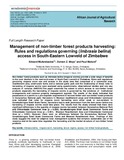Please use this identifier to cite or link to this item:
https://cris.library.msu.ac.zw//handle/11408/725| Title: | Management of non-timber forest products harvesting: rules and regulations governing (Imbrasia belina) access in South-Eastern lowveld of Zimbabwe | Authors: | Mufandaedza, Edward Moyo, Doreen Z. Makoni, Paul |
Keywords: | Imbrasia belina, mopane worm, harvesting, tenure regime, access, non-timber forest products | Issue Date: | 19-Mar-2015 | Publisher: | Academic Journals | Series/Report no.: | African Journal of Agricultural Research;Vol.10(12), p. 1521-1530 | Abstract: | Non timber forest products such as Imbrasia belina (mopane worms) provide a wide range of benefits to the rural dwellers in the semi-arid areas of South East Lowveld of Zimbabwe. Rules and regulations governing mopane worm use and access in the study area that comprised of a communal area, resettlement area, small-scale farms and a national game park and the relationship of these rules to harvesting of mopane worms were analysed using questionnaire, observational studies and one way analysis of variance (ANOVA).This paper examines the extent to which access to non-timber forest products especially the harvesting of mopane worms is governed by the existence of institutional arrangements and common property management regimes. The results of the study indicated that possession of a permit is a pre-requisite requirement to harvest timber and non-timber forest products in Gonarezhou National park. Harvesters in Mwenezi resettlement areas and Chikombedzi communal area indicated that rules for mopane worm harvesting were either weak or non-existent. In Gonakudzingwa Small Scale Farms, harvesters had to seek permission from the farm owner before any harvesting of mopane worms could take place. The results from the study showed that there were significant differences in the quantity of mopane worms harvested between Gonarezhou National Park and Chikombedzi Communal Area (p = 0.036), Gonakudzingwa Small Scale Commercial Farms and Chikombedzi Communal Area (p = 0.001), Mwenezi Resettlement Area and Chikombedzi Communal Area (p = 0.001). However, there were no differences between the Gonarezhou National Park, Gonakudzingwa Small Scale Commercial Farms and Mwenezi Resettlement Area. Findings of this study suggest the need for adaptive local management systems that enhance sustainable use of the resource and at the same time regulates the harvesting and the market structure of non-timber forest products. | URI: | http://hdl.handle.net/11408/725 | ISSN: | 1991-637X |
| Appears in Collections: | Research Papers |
Show full item record
Page view(s)
16
checked on Jul 26, 2024
Download(s)
8
checked on Jul 26, 2024
Google ScholarTM
Check
Items in MSUIR are protected by copyright, with all rights reserved, unless otherwise indicated.




